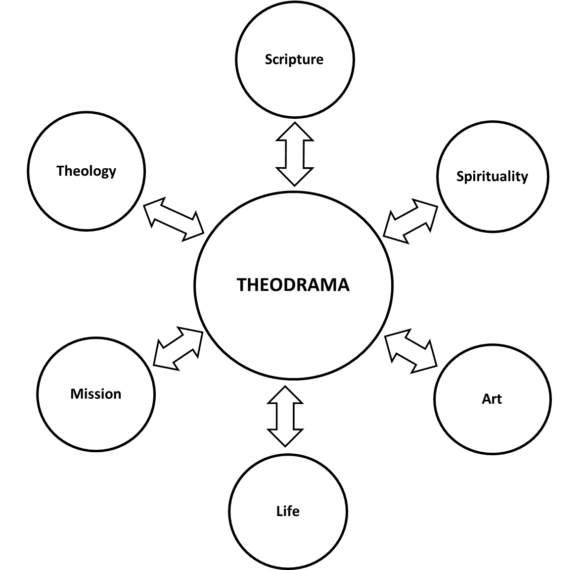The theodrama paradigm is established in relation to these 6 realms in a mutually influential way as follows:

Based on the classic theodrama theories—especially those of Hans Urs von Balthasar and Kevin Vanhoozer, as well as our experimental stage productions at ACTS University—a holistic paradigm of theodrama can be formulated. In this (essentially) hermeneutical process, there are a number of key factors which need to be considered: (1) Scripture, (2) theology, (3) spirituality, (4) art, (5) life, and (6) mission.
There are basically two directional flows in this process. First, the above factors contribute to the actual ‘formation’ of the theodrama paradigm. Second, these factors themselves undergo significant ‘transformation’ under the influence of the theodrama paradigm. The theodrama paradigm is multi-faceted and holistic in its formation as a result of the diverse contributing factors:
- The Scripture as the script (and our transcript/prescript) of the God-human drama is the initial starting point of the theodrama paradigm.
- The orthodox theology provides the inspiration and motivation in articulating the essential biblical themes underlying the grand theodrama.
- From a spirituality point of view, the Trinitarian spirituality and incarnational spirituality are foundational for conceptualizing and practicing theodrama.
- The realm of art, with its emphasis on aesthetics, imagination, creativity, and expression, naturally informs and enriches the ideology of theodrama.
- Life in general becomes the second axis of drama. Hermeneutically, theodrama takes place in mutual relationship between the biblical revelation and life.
- The missional vision challenges the theodrama paradigm to be actualized more dynamically and efficiently in the context of contemporary situations
Conversely, the theodrama paradigm is instrumental in help transforming the six areas of concern:
- The theodrama paradigm introduces the somatic, kinesthetic, and theatrical paradigm for a dynamic interpretation of the Bible.
- The theodrama paradigm helps enhance theological education by introducing the performative theory, which integrates mind, body, speech, and action.
- A sound biblical-theological theodrama, with its emphasis on the life of Christlikeness, establishes the basis for Christian spirituality.
- The theodrama vision helps to transform the realm of art/culture in accordance with Richard Niebuhr’s view of ‘Christ transforming culture.’
- Realizing that life itself is theodrama helps us to live a fuller life of intimacy with and trust in God.
- The theodrama paradigm contributes to evangelism/mission in terms of missional hermeneutics, performative methodology, and life drama encounter.
As a result, the theodrama paradigm signifies a dynamic transformative process, which Max Harris articulates as ‘theatrical hermeneutics’ : “If … there is a transformation effected when word becomes performance and, in reverse when performance is encoded in text, and if … the Christian concept of God’s mode of self-revelation is theatrical, then the sensitive reader of script and Scripture alike will need to engage in a form of theatrical hermeneutics that both animates and interprets text.” [Max Harris, Theater and Incarnation, 2005, p. 12]